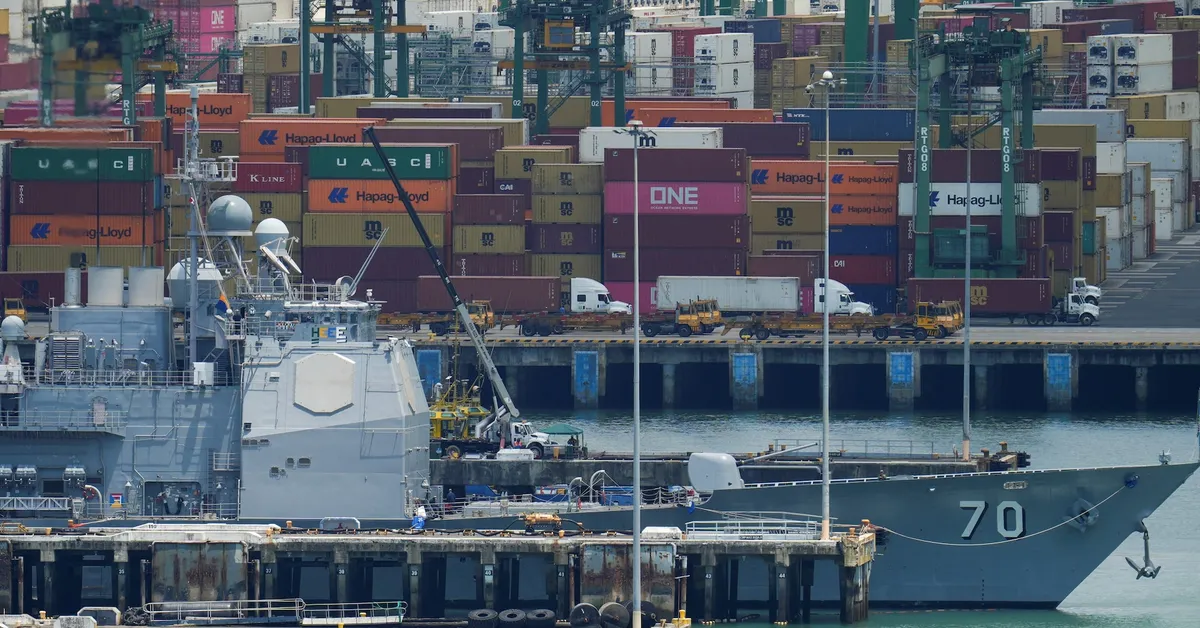
On August 29, 2023, a significant buildup of U.S. naval forces was reported in and around the Southern Caribbean, prompting speculation among officials in Caracas and analysts in the United States. The key question arises: Is this military presence intended to combat drug cartels, as suggested by the Trump administration, or does it have a different motive altogether?
The U.S. has deployed seven warships, including a nuclear-powered fast attack submarine, to the region, accompanied by over 4,500 sailors and marines. President Donald Trump has emphasized that combating drug trafficking is a central focus of his administration, with officials indicating that the military actions aim to confront threats posed by these criminal organizations.
Stephen Miller, the deputy White House chief of staff, stated that the military buildup is specifically designed to combat and dismantle drug trafficking organizations and foreign terrorist groups operating within the hemisphere. However, there remains uncertainty regarding how the U.S. military presence would effectively disrupt the drug trade, particularly since much of the seaborne drug trafficking directs towards the United States via the Pacific Ocean rather than the Atlantic.
Venezuelan officials, including President Nicolas Maduro, assert that the U.S. military's true target may be their government. Following the U.S. decision to double the reward for information leading to Maduro's arrest to $50 million, allegations of drug trafficking have intensified. Venezuelan leaders, including Interior Minister Diosdado Cabello, have condemned the U.S. naval deployments as a violation of international treaties.
The current naval buildup is notable, exceeding the regular U.S. Coast Guard and Navy operations typically seen in the Southern Caribbean. Among the warships present are the USS San Antonio, USS Iwo Jima, and USS Fort Lauderdale, all equipped with capabilities to deploy aerial assets and Tomahawk cruise missiles. Additionally, U.S. forces have been conducting surveillance flights with P-8 spy planes over international waters, gathering crucial intelligence.
The Trump administration has indicated that military action against drug cartels is a priority, and the Pentagon has been directed to prepare potential strategies. U.S. Secretary of State Marco Rubio visited the Southern Command headquarters in Doral, Florida, to oversee operations in the region, reinforcing the administration's commitment to addressing drug trafficking.
Experts like David Smilde from Tulane University interpret the military movements as an effort to exert pressure on Maduro's government. "This is an attempt to apply maximum military pressure on the regime," Smilde stated, characterizing the approach as a form of gunboat diplomacy—a tactic reminiscent of earlier military strategies.
Despite the naval forces operating in the Caribbean and Atlantic, the U.N. Office on Drugs and Crime has highlighted that the Pacific Ocean remains the primary route for cocaine trafficking. The 2023 Global Report on Cocaine indicated that 74% of cocaine flowing from South America is trafficked via the Pacific, with traffickers often using clandestine flights to transport drugs through the Caribbean, naming Venezuela as a significant departure point.
Ambassador Samuel Moncada has voiced concerns that the U.S. naval buildup may lay the groundwork for an intervention against a legitimate government. When questioned about the possibility of regime change, a senior U.S. official clarified that the military presence is intended to ensure that drug smuggling does not occur, labeling the Maduro regime as a narco-terror cartel. White House Press Secretary Karoline Leavitt reaffirmed this stance, asserting that Maduro is not a legitimate president but rather a fugitive leader of a drug cartel.
While the naval forces present in the region are substantial, U.S. officials acknowledge that they are still insufficient for a sustained military operation, such as the 1989 invasion of Panama aimed at capturing dictator Manuel Noriega. Christopher Hernandez-Roy from the Center for Strategic and International Studies noted that while the buildup could potentially be used for a strike in Venezuela, it may also serve as a mere show of force, indicating that the situation remains complex and multifaceted.
In conclusion, the recent U.S. naval buildup in the Southern Caribbean raises questions about its true purpose—whether it is primarily aimed at combating drug trafficking or exerting pressure on the Venezuelan government. As tensions continue to rise, observers will be closely monitoring the developments in this critical geopolitical region.